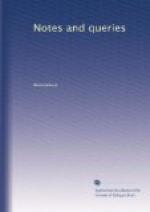R.E.G.
4. Lidlington Place, Harrington Square.
Erasmus and Farel.—In D’Aubigne’s History of the Reformation, ii. 149. (White’s Translation), it is said that Erasmus “instead of Farellus would often write Fallicus, thus designating one of the frankest men of his day with the epithets of cheat and deceiver.”
But Mr. Dyer, in his late Life of Calvin, spells the word Phallicus, and supposes it to allude to some amorous propensities of the reformer.
Which of these authorities are we to believe?
J.C.R.
Early Culture of the Imagination.—I have somewhere read, possibly in an article of the Quarterly Review, the opinion very strikingly expressed, and attributed to Mr. Lockhart, that children’s imaginative faculty ought to be more prominently cultivated than their reason; and, on this ground, the reading of Fairy Tales, The Arabian Nights, &c. was recommended for children. Will any one kindly refer me to this passage? And, as it is wanted for an immediate purpose, an early insertion and reply to this query will oblige me.
ALFRED GATTY.
Sir Thomas Bullen’s Drinking Horn.—Does any one know whether the drinking horn which belonged to Sir Thomas Bullen still exists? By the will it was directed to be kept as a heir-loom.
P.
Peter Sterry.—In the title-page and address to the reader of Peter Sterry’s Appearance of God to Man in the Gospel, &c., and other his posthumous discourses, 4to. 1710, mention is made of certain miscellaneous tracts, letters, &c., taken from original MSS. left by him, whose publication was made to depend on the success of the above work. Sterry was spoken of by Baxter in complimentary terms, notwithstanding his peculiar sentiments and manner of writing; and in a MS. note on the title-page of Sterry’s Discourse of the Freedom of the Will, folio, 1675, he is said to have been “chaplain first to Lord Brooke, afterwards to Oliver Cromwell.” If any of your readers can say whether the “miscellaneous tracts,” &c., were ever published, and, if not, where the MSS. are likely to be found, with any further information concerning him, which is desired by many persons deeply interested in his history and writings, it will confer a favour on me.
Lord Clarendon notices a work of Sir Harry Vane (who was an associate of Sterry’s), entitled Love to God, &c.[1] I should also be glad to know where that work may be found.
[Footnote 1: [The title of Vane’s work is, Of the Love of God, and Union with God, 4to. 1657. It is not to be found in the Catalogues of the British Museum, Bodleian, Sion College, D. Williams’ library, or London Institution.]]
J.P.
"Words are Men’s Daughters,” &c.—
“Words are men’s daughters, but God’s sons are things.”
Where does this verse occur? Who was the author? Can any parallel passages be adduced?




